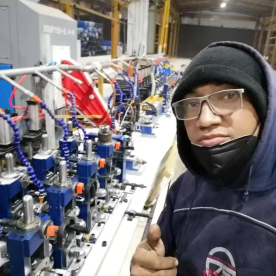[Solid State HF Welder Replacement Parts]Essential Guide to Finding Quality Solid State HF Welder Replacement Parts for Enhanced Performance and Longevity
News 2024-9-6
****When it comes to industrial welding, the efficiency and reliability of equipment are paramount. Among various welding technologies, Solid State High-Frequency (HF) welders stand out due to their precision and ability to produce high-quality welds. However, like any piece of machinery, these welders can experience wear and tear over time, necessitating the need for replacement parts. This guide aims to underscore the importance of solid state HF welder replacement parts, the types of parts available, and tips for ensuring you select the right components for your welding equipment.
Understanding Solid State HF Welders

Essential Guide to Finding Quality Solid State HF Welder Replacement Parts for Enhanced Performance and Longevity

Essential Guide to Finding Quality Solid State HF Welder Replacement Parts for Enhanced Performance and Longevity

Essential Guide to Finding Quality Solid State HF Welder Replacement Parts for Enhanced Performance and Longevity
Types of Replacement Parts for Solid State HF Welders
1. **Oscillator Components**: The oscillator is pivotal in generating high-frequency signals. Symptoms of a failing oscillator may include inconsistent welding performance or complete failure to start. Replacement parts can include tuning capacitors, inductors, or entire oscillator circuit boards.
2. **Transformer Parts**: Although Solid State HF welders don’t rely on traditional transformers in the same way as older models, some parts that adjust or affect power delivery may still require replacing. Keeping these components in top shape ensures proper current distribution and efficiency.
3. **High-Frequency Cable Assemblies**: These cables are responsible for transmitting the high-frequency signals from the generator to the weld head. Damaged or worn cables can lead to poor weld quality or failures; thus, timely replacement is critical.
4. **Electrodes and Tips**: The welding electrodes and tips are components that come into direct contact with the materials being welded. They wear out over time and require regular replacement to prevent contamination affecting weld quality.
5. **Cooling Systems**: Effective cooling systems are vital as excessive heat can damage the welder's internal components. Replacement parts may include fans, pumps, or heat exchangers that keep the machine operating within safe temperature ranges.
6. **Control Modules and Interfaces**: Modern HF welders feature sophisticated control systems that dictate operations. If these fail, the entire operation can halt. Replacement parts might include circuit boards, user interface panels, or software upgrades.
Tips for Selecting Replacement Parts
1. **Quality Assurance**: Always opt for OEM (original equipment manufacturer) parts or reputable aftermarket components. While cheaper options may seem appealing, they often lack the reliability and longevity that quality parts provide.
2. **Compatibility**: Ensure the parts you are selecting are compatible with your specific welder model. Consult your equipment’s manual or manufacturer for specifications.
3. **Warranties and Guarantees**: Choose replacement parts that come with warranties or guarantees. This can provide peace of mind and confidence in the durability of the components.
4. **Supplier Reputation**: Research suppliers to find reviews and testimonials about their customer service and product quality. A well-regarded supplier will likely offer a better selection and support.
5. **Expert Advice**: Don’t hesitate to seek advice from professionals in the welding industry or consult with your equipment dealer. They can offer insights into what parts are best suited based on their experience and expertise.
Conclusion
Investing in quality solid state HF welder replacement parts is vital for sustaining the performance, efficiency, and longevity of your welding equipment. By understanding your welder's needs and the types of available components, you can make informed decisions that keep your operation running smoothly. Prioritize regular maintenance and timely replacement to ensure that your solid state HF welder continues to produce superior welds for years to come.
